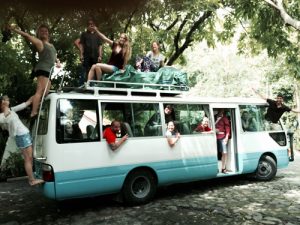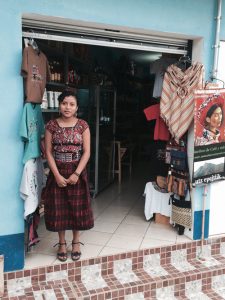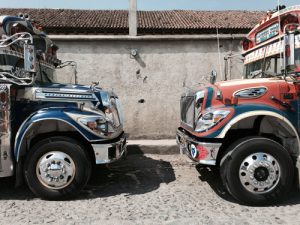
Happiness lessons
In the beginning our band of Guatemala explorers draws together like a clump of magnets polarized by the energy of our shared mission. At the end we dissipate like grains of sand between spread fingers. One of us stays at Lake Attitlan, another drops off in Antigua, three more head for separate destinations from Guatemala City’s airport, and two more fly away in Houston. Tears accompany each parting as the bonds we’d forged slowly stretch across the hemisphere.
Everyday in Guatemala, with one exception, our constant companion is Eric, the driver of a small passenger bus we named Gus. Like most Guatemalans, he is building a better life for himself, driving part time and going to college. Few Guatemalans have the means to attend college. Like many, Eric dreams of a move to the U.S. During our confinement on the bus, he practices his English and we practice our Spanish. And sometimes we actually understand each other. Over the many miles we share together, we joke, laugh, eat, drink and even weep. A limerick slam keeps us entertained for hours. The roads teem with life. Colorfully painted public buses, with equally colorful names like Princesita, Santa Je and Perla Antiglana, joust for road space. Moving with the deftness of bullfighters, vendors offer freshly cut fruit or drinks, even chairs, at the windows of buses, trucks and automobiles alike. Potholes, washouts, and cobblestones pulse through the bus tires and suspension causing us to dance involuntarily in our seats. The rural roads are the worst, but Eric smoothly navigates Gus around and through the hazards. Though poorly behaved Guatemalan drivers present more significant hazards than fixed obstacles, Eric never loses his cool. Now you might think Guatemala is pure chaos, and there are plenty of reasons for drawing that conclusion. Every streambed and river we cross is crowded with litter, trash and sewage. The smell of open fires and exhaust from vehicles is constant. People on foot and bicycle share six lane thoroughfares with motorcycles, trucks, cars, and buses. And by share I mean, pedestrians zigzag through the speeding vehicles, motorcycles careen down sidewalks, and tuk-tuks ignore all traffic laws. Advertising assaults the eyes from every vertical surface. Rare is the ad that is able to rise above the visual cacophony of the rest. Discordant strings of wire randomly drape from poles and buildings in the dystopian landscape. At times I imagine the four horsemen of the apocalypse riding up and over a hillside, cutting a swath through crumbling tenements.
However, underneath the chaotic patina, is a sense that every Guatemalan family is intimately rooted in the land and each soul is a branch on a single national tree. Disorder comes from forces alien to the natural order. Conglomerates own vast tracts of land and extract everything of value leaving the costs of exploitation to be paid by those who possess little, severing the people’s roots. Environmental degradation, poverty and poor health are externalities for which corporations take no responsibility. Despite all of that, the inner goodness and humanity of the Guatemalan people shined through in almost every encounter. They open their hearts, homes and business to us. More than once they feed us extravagantly, and without compensation. Dignity, pride and entrepreneurial spirit are not in short supply. Love, hope and happiness abound in their lives. Guatemalan people spread those three blessings among us during our time with them.
Before this trip, I wanted to learn more about Guatemala, its people and the challenges they face. Uncovering paths to deeper happiness for the Guatemalan people was the goal. What I found was we have more to learn from Guatemalans about a deeper happiness, than we have to teach. They already know that happiness is gained from family relationships, deeply held values, work and community. They may have less personal freedom, fewer choices of work, lower incomes and multiple health challenges, but they make the most of the happiness opportunities available to them.
Over 12 days with my 17 compatriots we became a family and enjoyed more opportunities for happiness because of our deeper relationships, shared values and research work. Seventeen of us, welded together in the heat and humidity of Guatemala, now disperse taking photos, hugs and lasting memories. Our experiences morphed us from a group of people with common interests, to friends, and finally into one big happy family.




